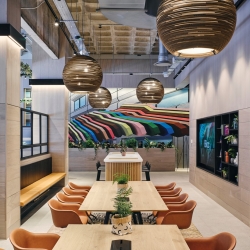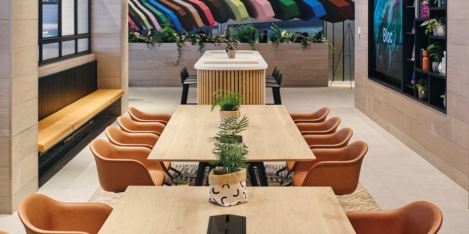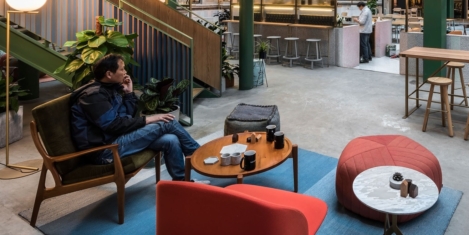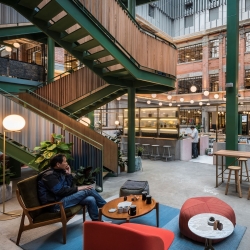To provide the best experiences, we use technologies like cookies to store and/or access device information. Consenting to these technologies will allow us to process data such as browsing behaviour or unique IDs on this site. Not consenting or withdrawing consent, may adversely affect certain features and functions.
The technical storage or access is strictly necessary for the legitimate purpose of enabling the use of a specific service explicitly requested by the subscriber or user, or for the sole purpose of carrying out the transmission of a communication over an electronic communications network.
The technical storage or access is necessary for the legitimate purpose of storing preferences that are not requested by the subscriber or user.
The technical storage or access that is used exclusively for statistical purposes.
The technical storage or access that is used exclusively for anonymous statistical purposes. Without a subpoena, voluntary compliance on the part of your Internet Service Provider, or additional records from a third party, information stored or retrieved for this purpose alone cannot usually be used to identify you.
The technical storage or access is required to create user profiles to send advertising, or to track the user on a website or across several websites for similar marketing purposes.










 An overtime “epidemic” driven by the rise in home working during the pandemic must be curtailed with new right to disconnect laws, according to a
An overtime “epidemic” driven by the rise in home working during the pandemic must be curtailed with new right to disconnect laws, according to a 
 Nearly half (42 percent) of employees think the working culture of their organisation has deteriorated during the pandemic. That’s according to research by
Nearly half (42 percent) of employees think the working culture of their organisation has deteriorated during the pandemic. That’s according to research by 
 A third of UK workers admit they’ve forgotten the password to their computer, office entrance or locker, one in five workers have forgotten a colleague’s name or called them by the wrong name and say their small talk skills have been impacted by working from home. Those are some of the findings of a new report from
A third of UK workers admit they’ve forgotten the password to their computer, office entrance or locker, one in five workers have forgotten a colleague’s name or called them by the wrong name and say their small talk skills have been impacted by working from home. Those are some of the findings of a new report from 
 WeWork, arguably the world’s most talked-about flexible space providers, and Cushman & Wakefield, the global real estate services firm, have announced they have entered into an exclusive strategic partnership to market both landlords and businesses on WeWork’s management experience platform and on several new jointly developed ideas aligned with the new appetite for flexible working.
WeWork, arguably the world’s most talked-about flexible space providers, and Cushman & Wakefield, the global real estate services firm, have announced they have entered into an exclusive strategic partnership to market both landlords and businesses on WeWork’s management experience platform and on several new jointly developed ideas aligned with the new appetite for flexible working. 
 Scotland and Wales are the two UK countries where the most companies offer remote work positions at 2.96 percent and 2.48 percent respectively, according to a new study by the
Scotland and Wales are the two UK countries where the most companies offer remote work positions at 2.96 percent and 2.48 percent respectively, according to a new study by the 
 A gap is emerging between executive and employee perceptions on the future of the ’employee experience’, according to a report from Gartner. The 2021 Gartner Hybrid Work Employee Survey of 4,000 employees in January 2021 claims that there are six perception gaps that employers must resolve. The Gartner survey claims that 75 percent of executive leaders believe they are already offering a flexible employee experience, yet only 57 percent of employees indicate that their organisational culture embraces flexible working. Further, nearly three-quarters of executives believe the business understands how flexible work patterns support employees, but only half of employees share this view.
A gap is emerging between executive and employee perceptions on the future of the ’employee experience’, according to a report from Gartner. The 2021 Gartner Hybrid Work Employee Survey of 4,000 employees in January 2021 claims that there are six perception gaps that employers must resolve. The Gartner survey claims that 75 percent of executive leaders believe they are already offering a flexible employee experience, yet only 57 percent of employees indicate that their organisational culture embraces flexible working. Further, nearly three-quarters of executives believe the business understands how flexible work patterns support employees, but only half of employees share this view. 
 New research from the US based
New research from the US based 
 Throughout the pandemic many workplaces have offered their employees more flexibility. Flexible working options such as adjusting hours, days, or place of work, are attractive to many employees.
Throughout the pandemic many workplaces have offered their employees more flexibility. Flexible working options such as adjusting hours, days, or place of work, are attractive to many employees. 
 After more than a year of remote working, the majority of UK workers are well-versed in office-free employment. We’ve had plenty of time to think about how the experience has affected our working habits.
After more than a year of remote working, the majority of UK workers are well-versed in office-free employment. We’ve had plenty of time to think about how the experience has affected our working habits. 
 As SMEs emerge from the pandemic and with further changes to restrictions, it seems they have another challenge to face – the refreshed interest in and demand from employees to work in a company that meets their wellbeing needs, according to
As SMEs emerge from the pandemic and with further changes to restrictions, it seems they have another challenge to face – the refreshed interest in and demand from employees to work in a company that meets their wellbeing needs, according to 








August 4, 2021
No rush to get back to the office despite easing of restrictions
by Alexandra Anders • Comment, Flexible working, Working culture